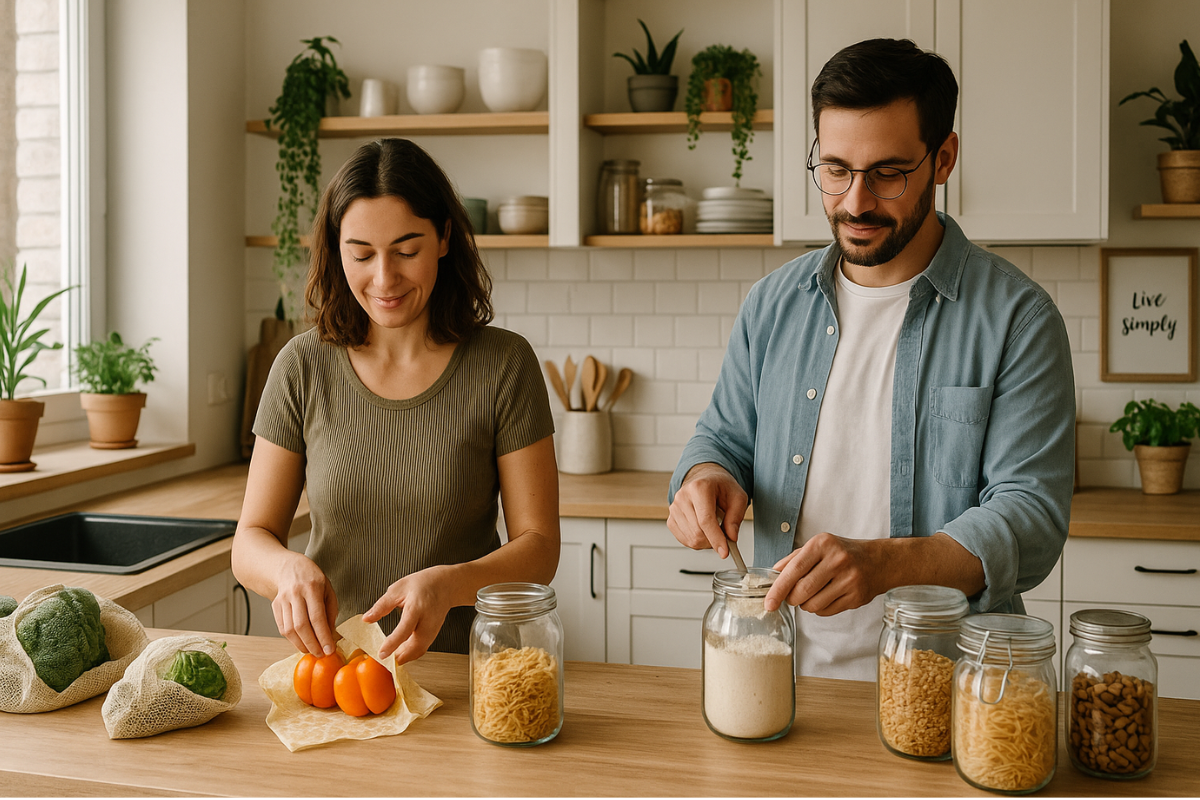The kitchen is the heart of most homes—and it’s also where a large portion of household waste, energy consumption, and unsustainable habits tend to live. The good news? A few strategic changes can turn your kitchen into one of the most eco-friendly spaces in your house.
Whether you’re cooking for a family or living solo, these sustainable kitchen tips are practical, affordable, and perfect for everyday life.
Reduce Food Waste
Wasted food is one of the biggest sustainability problems in modern kitchens. When food is thrown out, we waste all the resources used to produce, process, and transport it.
How to waste less:
- Plan your meals weekly
- Make a shopping list and stick to it
- Check expiration dates and prioritize older items
- Repurpose leftovers creatively (soups, wraps, fried rice)
- Freeze extras for future meals
A great practice is to keep a visible “eat me first” box in your fridge for food nearing its expiration date.
Choose Reusable Over Disposable
Single-use products might be convenient, but they generate enormous waste over time.
Easy reusable swaps:
- Paper towels → washable cloths
- Plastic wrap → beeswax wraps or silicone lids
- Disposable cutlery → metal or bamboo utensils
- Ziplock bags → silicone or fabric pouches
- Coffee pods → French press, drip, or refillable options
Not only do reusables reduce trash, they often save you money in the long run.
Optimize Food Storage
Storing food properly helps extend its life and prevent unnecessary waste.
Smart storage tips:
- Keep herbs in a glass of water, like a bouquet
- Store leafy greens with a cloth or paper towel to absorb moisture
- Use glass jars or containers to see what’s inside
- Label and date leftovers
- Store fruits and vegetables separately to avoid accelerated spoilage
A well-organized fridge also helps you avoid overbuying and forgetting items.
Shop Mindfully and Locally
Your kitchen becomes more sustainable before food even enters it—starting with how and where you shop.
Sustainable shopping habits:
- Choose seasonal, local produce
- Bring your own bags, containers, and jars
- Buy in bulk to reduce packaging
- Avoid plastic-wrapped fruits and vegetables
- Support farmers markets or community agriculture programs
Buying closer to the source reduces emissions and supports ethical food systems.
Compost Food Scraps
Even the most efficient kitchens generate food waste—like peels, stems, and coffee grounds. Composting keeps these out of landfills and returns nutrients to the earth.
Options for composting:
- Backyard bin or tumbler
- Indoor countertop bin
- Vermicomposting (worms)
- Community garden or city drop-off point
Start small by composting just your vegetable scraps and coffee grounds, and expand from there.
Clean With Eco-Friendly Products
Traditional kitchen cleaners often contain harsh chemicals and come in single-use plastic bottles.
Sustainable cleaning swaps:
- DIY all-purpose cleaner: vinegar, water, and lemon
- Refillable spray bottles
- Compostable sponges or reusable cloths
- Baking soda for scrubbing power
- Avoid disinfectant wipes in favor of washable cloths
These options are gentler on your health, wallet, and the planet.
Cook With Energy Efficiency in Mind
Small shifts in how you cook and use appliances can lower your energy consumption.
Tips to save energy:
- Use lids to reduce cooking time
- Match pot size to burner size
- Defrost food naturally instead of using a microwave
- Cook larger portions and store leftovers
- Use a toaster oven or air fryer instead of a full-sized oven
Unplug appliances when not in use—they often draw energy even when turned off.
Stock a Minimal, Sustainable Pantry
You don’t need 20 kinds of flour or every trendy superfood. Focus on staples you love and actually use.
Pantry essentials to consider:
- Grains (rice, oats, quinoa)
- Dried beans or lentils
- Seeds and nuts
- Olive oil or coconut oil
- Vinegar, spices, and herbs
- Refillable tea or coffee
Buy in bulk when possible and store them in airtight, reusable containers.
Switch to Plant-Forward Meals
Meat and dairy production are among the most resource-intensive parts of our food system. You don’t need to go fully vegan to make an impact.
Simple ways to shift:
- Try “Meatless Mondays”
- Use legumes as the base for meals
- Cook with tofu, tempeh, or mushrooms
- Explore world cuisines that focus on vegetables and grains
Even reducing meat intake a few times a week contributes to a more sustainable planet.
Your Kitchen, Reimagined
Transforming your kitchen doesn’t require fancy gadgets or a complete overhaul. The most sustainable kitchens are built one habit, one container, and one mindful purchase at a time.
By rethinking how you buy, cook, store, and dispose of food, you create a space that supports your health and the environment. Sustainability starts at home—and the kitchen is the perfect place to begin.
